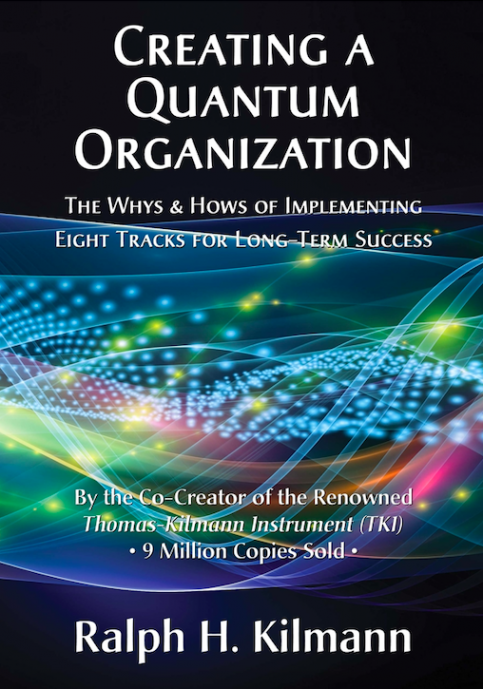Creating a Quantum Organization: The Whys & Hows of Implementing Eight Tracks for Long-Term Success
NEWPORT COAST, Calif. - Oct. 19, 2021 - PRLog -- Over the past 50 years, Ralph H. Kilmann, Ph.D., CEO and Senior Consultant at Kilmann Diagnostics and Co-Creator of the renowned Thomas-Kilmann Conflict Mode Instrument (TKI), has fine-tuned his time-tested and proven methods and tools for addressing four timeless issues that all organizations must face: conflict management, change management, expanding consciousness, and quantum transformation. In what is essentially his legacy book, Creating a Quantum Organization: The Whys & Hows of Implementing Eight Tracks for Long-Term Success (Kilmann Diagnostics; October 1, 2021; ISBN: 0989571335; $39.95 Hardcover), Kilmann shares the best practices for managers and members looking to transform their outdated, sluggish, ineffective, and unfulfilling Newtonian organizations into vibrant, effective, and meaningful quantum organizations. He calls this mega challenge Quantum Transformation.
Creating a Quantum Organization shares all that Kilmann has created for helping organizations achieve long-term success in the most accessible and user-friendly manner possible, including many new ways to use the TKI Conflict Model for individuals and their organizations. The famed Thomas-Kilmann Instrument (TKI), having sold over 9 million copies, is a widely used assessment tool that was created to accurately identify an individual's typical behavior in various conflict situations.
The book is organized into 12 chapters, including 167 elegant and enlightening illustrations that appear throughout the book. Each chapter presents Kilmann's decades of experience in teaching a wide variety of university and management training courses on conflict management and change management, all of which are now available as recorded online courses on his website.
In Chapter 1, Kilmann presents several "Big Pictures," also known as the Complex Hologram and the Quantum Wheel, which dramatically reveal all the interrelationships among systems, processes, and people - both inside and outside an organization.
The next chapters investigate the essence of conflict management and change management - since conflict and change comprise two sides of the same coin. You can't have one without the other: Change creates conflict and resolving conflict creates change.
The material on the Thomas-Kilmann Instrument (TKI) along with the Kilmann Organizational Conflict Instrument (KOCI) allows us to assess the self-defeating conflicts that members have with their surrounding systems and processes. Examining such "systems conflicts" will enable us to pinpoint the barriers to long-term success before attempting to implement a completely integrated program of eight tracks that's intended to transform those Newtonian "barriers to success" into quantum "channels for success."
Chapter by chapter, Kilmann then presents the most relevant and practical material for each of the eight tracks: culture, skills, teams, strategy-structures, reward systems, and the three process improvement tracks. Indeed, any program of change or set of change initiatives that implements these eight tracks out of sequence or fails to address all eight tracks in their entirety, will inadvertently prevent people and their organizations from realizing their dreams.
Lastly, Kilmann addresses the future of organizational development and quantum transformation by exploring how to expand the mind/body/spirit consciousness of all members – and then bring that expanded consciousness into the workplace.
Chapter 1 – Seeing the Big Picture
Chapter 2 – Basic, Group, and Advanced Training in Conflict Management
Chapter 3 – Diagnosing Systems Conflicts
Chapter 4 – Quantum Transformation for Organizations
Chapter 5 – Culture Management for Organizations
Chapter 6 – Critical Thinking Skills for Organizations
Chapter 7 – Team Management Skills Training
Chapter 8 – Aligning Strategy-Structure Throughout an Organization
Chapter 9 – Designing Reward Systems for Organizations
Chapter 10 – Improving Process Management for Organizations
Chapter 11 – Expanding Consciousness in Organizations
Chapter 12 – Twenty Critical Success Factors
Kilmann perfectly closes the book with this quote:
"Although an organization's long-term success can never be guaranteed, the probabilities are remarkably increased when all members become active and enlightened participants who are inspired to contribute all their wisdom, experience, passion, and mind/body/spirit consciousness to their revitalized — and fully aligned — quantum organization."
ABOUT THE AUTHOR:
Ralph H. Kilmann, Ph.D., is CEO and Senior Consultant at Kilmann Diagnostics (KD). In this position, he has created as well as produced all of KD's online courses and assessment tools on conflict management, change management, expanding consciousness, and quantum transformation. Ralph's online products are used by such high-profile organizations as Amazon, Bank of America, DuPont, Exxon Mobil, FedEx, GE, Google, Harvard University, JP Morgan Chase, Microsoft, NASA, Siemens, Twitter, the U.S. Army, and the World Health Organization.
Ralph Kilmann is an internationally recognized authority on systems change. He has consulted for numerous corporations throughout the United States and Europe, including AT&T, IBM, Ford, General Electric, Lockheed, Olivetti, Philips, TRW, and Xerox. He has also consulted for numerous healthcare, financial, and government organizations, including the U.S. Bureau of the Census and the Office of the U.S. President. Kilmann has published more than twenty books and one hundred articles on such subjects as conflict management, organizational design, problem management, change management, and quantum organizations. He is also the coauthor of more than ten assessment tools, including the Thomas-Kilmann Conflict Mode Instrument (TKI), the Kilmann-Saxton Culture-Gap® Survey, and the Kilmann Organizational Conflict Instrument (KOCI).
From 1991 to 2001, Kilmann was the George H. Love Professor of Organization and Management at the Katz School of Business, University of Pittsburgh, following his previous twenty years as a full-time faculty member at the same university.
Ralph Kilmann earned both his B.S. in graphic arts management and M.S. in industrial administration from Carnegie Mellon University, and a Ph.D. degree in the behavioral sciences in management and social systems design from the University of California, Los Angeles.
He resides in Newport Coast, California.
Contact
Maureen Kelly
***@bizbookpr.com
Photos: (Click photo to enlarge)

Read Full Story - Legacy Book on Managing Conflict and Change by Co-creator of the TKI | More news from this source
Press release distribution by PRLog
|
Quantitative strategies, Wall Street-caliber research, and insightful market analysis since 1998. |
|||
Data & News supplied by www.cloudquote.io
Stock quotes supplied by Barchart Quotes delayed at least 20 minutes. By accessing this page, you agree to the following Privacy Policy and Terms and Conditions. |
|
||
|
|||
